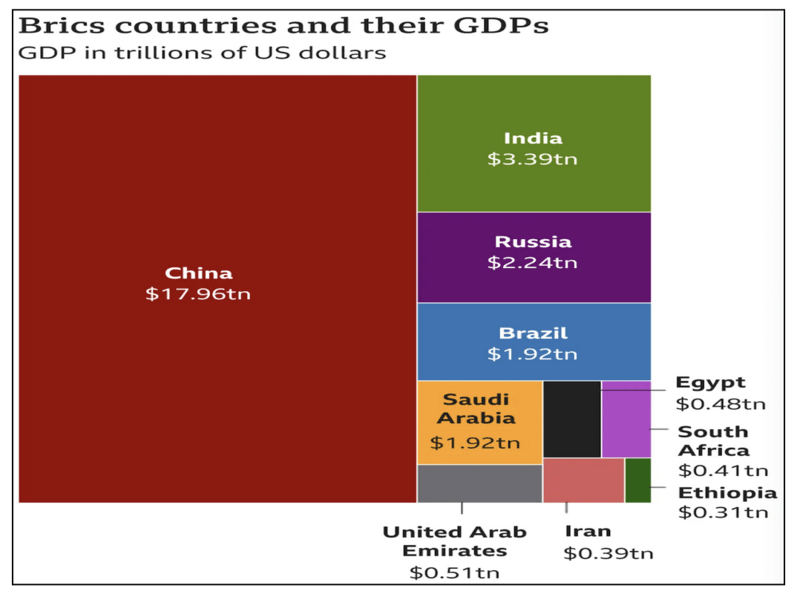GS Paper III
News Excerpt:
Egypt, Ethiopia, Iran, Saudi Arabia and the United Arab Emirates have confirmed they are joining the BRICS bloc after being invited last year to Johannesburg in the BRICS 2023 summit.
About BRICS:
- In 2006, Brazil, Russia, India and China created the "Bric" group. South Africa joined in 2010, making it "Brics".
- The group was designed to bring together the world's most important developing countries, to challenge the political and economic power of the wealthier nations of North America and Western Europe.
- The group sets priorities and makes decisions at an annual summit. Members take it in turns to serve as president for a year.
Why does BRICS matter?
- Brics countries include major world powers, such as China and Russia, and countries which are influential on their continent, such as South Africa and Brazil.
- The expanded group has a combined population of about 3.5 billion, or 45% of the world's inhabitants.
- Combined, members' economies are worth more than $28.5tn - about 28% of the global economy.

- With Iran, Saudi Arabia and UAE as members, Brics countries produce about 44% of the world's crude oil.
- In 2014, the Brics nations set up the New Development Bank to lend money to boost infrastructure.
- By the end of 2022, it had provided nearly $32bn to emerging nations for new roads, bridges, railways and water supply projects.
Significance of New members joining the BRICS:
- Economic Heft: The expansion adds economic heft to BRICS, as the new members, such as Saudi Arabia, Iran, and the United Arab Emirates, bring significant energy resources and contribute to the group's combined GDP.
- Global Shift: The addition of new members signifies a notable shift in the global landscape, characterized by increasing multipolarity and assertive middle powers challenging the established order.
- Geopolitical Influence: The expansion of BRICS with new members from the Middle East and Africa enhances the geopolitical influence of the bloc, providing a counterbalance to Western dominance.
- Potential for Multipolar World: Newly added members are energy exporting nations, so they could help BRICS countries in their energy demands.
- The inclusion of new members is seen as a strategic effort to reshape the global order into a multipolar world, with voices from the Global South taking a more prominent role on the international stage.
- Challenges and Opportunities: The expansion creates both challenges and opportunities, as it underscores the inherent challenges of achieving unified goals within a diverse global bloc, while also creating new investment opportunities and emphasizing the changing dynamics of international relations.
Conclusion:
BRICS, a group of major emerging economies, has grown by inviting Egypt, Ethiopia, Iran, Saudi Arabia, and the UAE. With around 40 nations interested, the expansion aims to boost Global South influence. The move opens doors for diverse trade and challenges the dominance of the US dollar.


